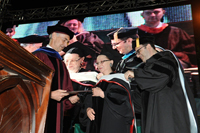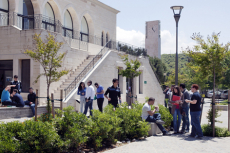AUB confers honorary doctorates to Chomsky, Hamama, ElAchi, and Irani during the Commencement Exercises for graduate students
research, and social and political activism; acting and film-making; science and technology; and business, philanthropy, and chemistry.
The award ceremony, took place at 7.30 pm on the AUB Green Field, during the commencement exercises for 502 graduate students, among who were six PhD candidates.
The four recipients were: linguist, philosopher, cognitive scientist, and social critic Noam Chomsky of the Massachusetts Institute of Technology (MIT); Lebanese-American Charles Elachi, director of the NASA Jet Propulsion Laboratory (JPL) at the California Institute of Technology; the legendary Egyptian film actress Faten Hamama; and Ray R. Irani, a distinguished international business leader, AUB alumnus, and trustee emeritus.
They were selected by AUB in recognition of the enduring impact of their work, their contributions to the advancement of knowledge through research, and their efforts to enrich quality of life in the region and around the world.
The event started with the traditional procession of faculty members in their academic regalia, led by Chief Marshall Huda Zurayk, who opened and closed the ceremony. AUB has been conferring honorary doctoral degrees on a regular basis since 1969, but the tradition was suspended for several years due to the 1975-1990 war and was re-established in 2003.
Attending the ceremony were a host of luminaries including Minister of Higher Education Hassan Diab, representing President Michel Suleiman and Prime Minister Najib Mikati; businessman Hisham Jaroudi, representing Prime Minister Designate Tammam Salam; MP Ali Bazzi, representing Speaker Nabih Berri.
“The four honorands we celebrate today have each exerted a profound impact of their own,” said AUB President Peter Dorman, introducing the recipients. “It requires courage to follow one’s deepest convictions and it is this courage that we hope and desire our students—indeed all of our community members—to embrace.”
Dorman then introduced each recipient and conferred an honorary doctoral degree of humane letters. Each recipient then delivered a brief acceptance speech.
Dorman then introduced each recipient and conferred an honorary doctoral degree of humane letters.
Highlighting Noam Chomsky’s contributions to linguistics, Dorman described the influential thinker and writer as “arguably one of the world’s leading intellectuals as well as the most famous political activist of the American left.”
Not only that, but Chomsky believes that intellectuals have a duty to expose lies and speak the truth – something which he has been doing passionately and courageously, noted Dorman.
“Above all, Chomsky is a champion of the rights of all people to basic human dignity, freedom, and self-determination,” added Dorman. “Denouncing oppression in all its forms, he has passionately embraced the Palestinian cause, and he remains a fierce critic of U.S. and Israeli policies in the Middle East.”
Dorman concluded: “For the courage to follow his deepest convictions and to speak out loudly against the complacent status quo, he is a shining example of what it means to be a deeply engaged citizen of the world.”
Chomsky responded by saying, “It is a real privilege to be awarded this honor from a great university. I wish I could feel that my generation, and its predecessors, deserve to be honored for the legacy that we are leaving to those who will soon have the fate of the world in their hands.”
Chomsky then warned the next generation of the serious problems it will have to face, noting that nuclear war and environmental catastrophe are two “grim shadows that will hover over every topic” this generation will have to address.
“There have been impressive achievements in past years, but also striking failures, which leave young people today with problems and choices that are of a new order of difficulty and urgency,” Chomsky said. “Some are specific to the region, but others are shared with the rest of the world. For the first time in history, humans have progressed to the stage where they can destroy the basis for decent survival.”
Describing Charles Elachi as “an abundantly educated man… a prominent researcher, enthusiastic team leader, and intrepid innovator” who spent his career “exploring the vast reaches of space and illuminating the mysteries of our universe,” Dorman noted that Elachi “has brought great honor to his native land with his bountiful scientific achievements and his outstanding leadership.”
Since 1970, Charles Elachi has served at NASA’s Jet Propulsion Laboratory and has been its director since 2001, leading some of its most high-profile and innovative space exploration initiatives.
“His exemplary record of service is not only a gift to the citizens of his adopted country and to his home country, but to all nations of this third planet from the sun,” added Dorman, before inviting Elachi to receive his honorary doctorate.
In his acceptance speech, Elachi recalled how California and NASA had seemed a world away for him, as a young boy growing up in the Bekaa.
“I might have thought, as a young person, ‘That is a world I will never get to.’ But I am very grateful now that I didn’t hold myself back,” he said. “To get to the Jet Propulsion Lab, I had to take risks – to let myself be bold. And I strongly encourage all of you to do the same as you start your diverse careers.”
Even in his career as an engineer and scientist with the JPL, he and his team also had to take risks in order to get their big rover to land successfully on Mars.
“If I leave you with no other thought today, the most important message I can convey is this: Be bold in whatever you undertake. If you always stick to the safe path, you may never know your possibilities. But if you are bold and proactive, you may not always succeed, but you know you are making the most of your abilities.”
President Dorman then introduced actress and Egyptian actress Faten Hamama as an “icon, legend, and luminary.”
“Faten Hamama evokes such grandiloquent titles,” he said. “Her visceral screen presence has captivated audiences for over 70 years and she remains the “Lady of the Arabic Screen.”
Dorman underscored Hamama’s evolution in her career and her later choices of challenging dramatic roles in films with powerful messages, addressing political and societal themes. “She is even credited with having spurred a change to the Egyptian law that forbade Khulu’ (خلع)—a divorce initiated by the wife—following her influential film, Oureedou Hallan (I Want a Solution),” Dorman said.
“Today we acknowledge Faten Hamama for her game-changing work in Egyptian cinema and for raising the level of this artistic medium in the Arab world,” he added. “We honor her not only for a lifetime of achievement as an actor and producer in film and television, but also as an agent for change in this region. Most of all, we salute Faten Hamama for practicing her craft with supreme grace and dignity and—through her art—helping us to appreciate our own humanity.”
“I feel a great happiness, today, greater than any gift that I have ever received,” said Hamama, after receiving her doctorate. “Currently, there is a massive attack on art, culture and anything related to literature. So this honorary doctorate will not only make me happy, but will bring happiness to all the artists and cultured people in Egypt and the Arab world.”
A successful businessman and generous supporter of his alma maters, both AUB and the University of Southern California, businessman and AUB alumnus Ray Irani’s gift in chemistry was recognized early on by one of his AUB professors. By the age of 22, he had finished his doctoral degree in chemistry, and in the first 10 years of his career, he registered 150 patents.
Irani has been a member of the AUB Board of Trustees for over 25 years, serving as vice-chair and finally as co-chair for the past seven years. He was the CEO and chairman of Occidental Petroleum for 20 years until a month ago.
President Dorman described him as someone who has always “found unparalleled success in whatever he put his hands to: from academic studies to scientific research to the corporate boardroom.”
“He has a talent for recognizing and seizing opportunities, and he also recognizes the need to give back to the community and stay true to his heritage,” he added.
Dorman also noted Irani’s deep understanding of international affairs and economics, which allowed him to contribute his wide-ranging expertise to numerous high-level committees and boards of the U.S. government, including the Secretary of Energy’s Advisory Board and the White House-sponsored Task Force for Humanitarian Relief in Lebanon.
“Today, I am pleased and honored to award Ray Irani our highest mark of distinction for his distinguished contributions to science, his leadership in the energy domain, and for his exemplary service to this university,” Dorman said.
Following the conferring of honorary doctoral degrees, the 502 graduate students were given their master’s degrees, MDs or PhDs. For the second year in a row, the commencement exercises were split over two days, with graduates receiving their degrees on June 14, 2013 and undergraduates receiving theirs on June 15, 2013.
Keynote speaker Ray Irani expressed his gratitude for being honored by AUB and told the graduates to work hard, spend their time wisely, surround themselves with quality people, lead a balanced life, and be thoughtful before making major decisions.
Congratulating them on their choice of AUB, which has all the capabilities to help prepare them for the changing job market, with its competitive global talent, Irani told the students: “You have worked hard and dedicated yourself to learning, but the most important skill you’ve learned is how to learn.”
Irani urged graduates to continue learning, not only in their own specialties, but to also be curious about the world at large.
“So you can connect the dots of what you are doing to even larger issues and possibilities,” he added.
Student representatives also spoke at the ceremony.
Wajiha Jurdi Kheir, a candidate for the degree of Doctor of Medicine from the Faculty of Medicine, told her classmates that med school taught her to value life and to be ready to fight for it. With the start of a new phase in life, Kheir shared with her fellow graduates “the most important lesson I have learned because of AUB.”
“Do not ever settle – not in your professional life, not in your personal life,” she said. “Do not be just another physician, be a holistic healer and patient’s advocate. Do not be just an acquaintance, be a friend. Do not be just a spouse, be a soul mate. Finally, do not settle by being an idle citizen, try to instill change wherever it is needed. If you will not do it, who else will?”
Rabih Baz Radwan, a candidate for the degree of Master of Business Administration, addressed his classmates, highlighting why an MBA at AUB is more worthwhile than one at a European or US university because of the diversity present on campus and students’ unique experience. “AUB… sets an example of how we can, in this country, be civilized, organized, united, open minded, problem solvers, and achievers of results that we desperately need,” he added.






















